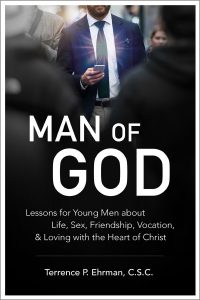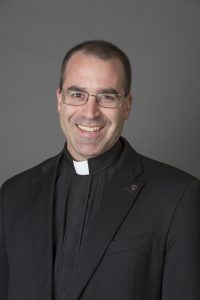September 23, 2017 // Special
Priest’s emails make case for the self-sacrificial love of Godly relationships
The challenges young men and women face in building relationships today seem increasingly daunting. Technological developments, even those meant to increase personal connectivity, tend to have the opposite overall effect when it comes to matters of the heart and fostering true unity between individuals. Perhaps this is most apparent on college campuses, where young men and women for the first time experience freedom and responsibilities in a new way that is wholly their own. Without proper guidance and direction, these young adults become susceptible to the temptations and pitfalls of a sexualized world that values personal satisfaction over relational cooperation and self-sacrificial love.
 It is for this reason that Holy Cross Priest Father Terrence Ehrman sought to write a book offering assistance to young people who are in the midst of these struggles. Recently published by Catholic Answers Press, “Man of God: Lessons to Young Men about Life, Sex, Friendship, Vocation, and Loving with the Heart of Christ” seeks to offer a pathway towards happiness and fulfilment by looking to Jesus, Mary and the saints as models for developing holy, healthy and life-giving relationships.
It is for this reason that Holy Cross Priest Father Terrence Ehrman sought to write a book offering assistance to young people who are in the midst of these struggles. Recently published by Catholic Answers Press, “Man of God: Lessons to Young Men about Life, Sex, Friendship, Vocation, and Loving with the Heart of Christ” seeks to offer a pathway towards happiness and fulfilment by looking to Jesus, Mary and the saints as models for developing holy, healthy and life-giving relationships.
Written as a series of emails from a priest to a recent college graduate seeking advice and guidance regarding his relationships, the book presents an ongoing and engaging conversation on contemporary issues that range from struggles with pornography and masturbation to questions about courtship and cohabitation.
Following the liturgical calendar, each correspondence focuses on a particular feast day or life of a saint to reveal how other men and women have demonstrated love and experienced fulfillment through a complete giving of themselves to others. In this way, the narrative story offers spiritual direction and wisdom for practical living.

Holy Cross Priest Father Terrence Ehrman serves as assistant director for life sciences research and outreach at the University of Notre Dame and chaplain for the Center of Ethics and Culture.
Father Ehrman, who serves as the assistant director for life sciences research and outreach at the University of Notre Dame, as well as chaplain for the Center of Ethics and Culture shared, “The idea for the book is rooted in Christian anthropology, which asks, “Who are we, as creatures, in relationship to God the creator? What is our relationship to ourselves, to other another and to the natural world?
“That is what this particular book explores. We are men and women; therefore, what does that mean and how do we live this life? This book is a tool not only for the person who wants to grow in holiness, but also for the one who will hand on how to be holy. It is not only forming the one who needs to be transformed, but also the mentor — the father, the uncle, the priest — who can hand on what it means not only how to life a moral life, but how to live a Catholic life as a follower of Christ.”
One challenge Father Ehrman sought to overcome was how to present traditional Catholic doctrine in an engaging style.
“I wanted to do more than just describe church teaching — there are many books which already do that — but to describe this content in a more narrative way. There is a personal, relational dimension, which is something I hope draws people in. Ultimately that is what this is about: looking at how we form robust relationships. The Trinity is relational, and we are made in the image and likeness of God, therefore, how should we live out that relationality and interact with others?”
Experiences of Father Ehrman’s own life helped shape the nature and structure of his book. He explains: “The main character in the book is a young man named Joseph, who stands in for every man. He is a fictional character, yet he is an amalgamation of real experiences that I have witnessed or heard about. The theme of “heart speaking to heart” also runs throughout the book, beginning in the first chapter with a focus on the Sacred Heart of Jesus, the patron of the Congregation of Holy Cross. Additionally, each chapter draws upon Scripture and incorporates the importance and necessity of the remaining connected to the sacraments as a means of overcoming temptation and achieving true freedom. “Additionally, I have always been drawn to and connected with the saints. Writing these chapters and seeking to integrate their lives into the story helped deepen my devotion and learn even more about them.
“One of the more unique and one of my favorite chapters,” Father Ehrman shared, “is on St. John Damascene. He was a figure responding to the iconoclast heresy, which viewed images as idols.
“The Council of Nicaea confirmed that we could venerate sacred images. In seeking to go from pornography to iconography or hagiography (the study of the saints), the chapter is placed in December, during the time of Advent. This is because pornography is an anti-Advent. Advent means “arrival” (of Christ), however, with pornography, you never arrive, you remain in your imagination, which leads to distortion, false worship, idolatry.”
The overall goal of the book is to transform hearts and minds of young men to become responsible, courageous leaders and to help them form holy and uplifting friendships. “It is a very positive book,” Father Ehrman shared. “It’s a very hope-filled book; people that are steeped and immersed in the sinful patterns of pornography and masturbation can be in a dark world and wonder “how do I get out of it?” It explores how you grow in freedom, respond to grace and live responsibly.” Father Ehrman also stressed that although the main character in the story is a recent college graduate, the book would be useful for high school students as well. “To be able to talk in a frank, yet discreet way about lust, pornography, masturbation, premarital sex, cohabitation, all the things people are doing, I think this would be good for all Catholic high schools across the country and for those in marriage prep, since once you get married these struggles don’t stop – it’s not a single man’s monopoly. It would also be good for seminarians, priests and religious who struggle with this, not only for their own growth in holiness, but also as future shepherds to be able to discuss in parishes and men’s groups.
“There are also many women who have read this, because it’s not just a man’s struggle; it takes two to dance. Women benefit because it provides info about the psyche of the man, but also because it gives thought to what they will choose to do before marriage in regard to the hook-up culture.”
In summarizing the key questions of his book, Father Ehrman asked, “How do we hand on what it means to be a man of God? There has been a great uncoupling of that dimension in our world. Men are very absent; there is an abdication of parenthood. For men searching for mentor figures, who do they turn to? Who are the ones who exemplify responsible fatherhood, who teach how to grow up, to live righteously?” He emphatically responded, “It is not in media, it is in the saints!”
The best news. Delivered to your inbox.
Subscribe to our mailing list today.






